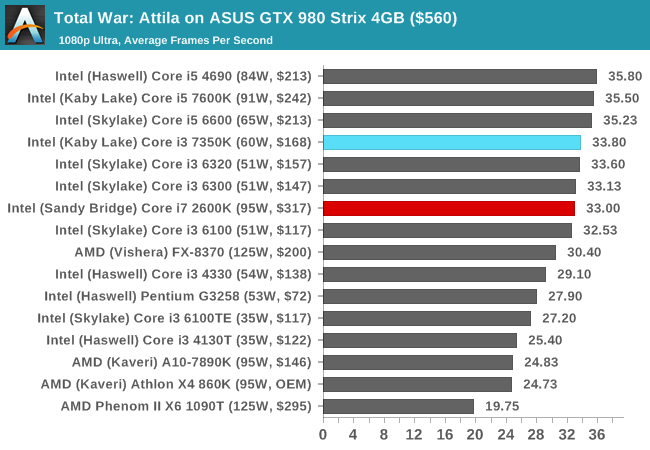As someone who upgraded from 4 cores to 6 cores less than a year ago I can safely say that people are actually heavily overestimating such need.
Some recent rather eye opening examples here include the launch of a
2-core i3 7350K with the following results:
http://images.anandtech.com/graphs/graph11083/85558.png
Let's wait for benchmarks, shall we?
I went into it in the 7700K review topic, but you should know that most of Anandtech's gaming benchmarks are basically worthless since they're all averages, and some are potentially GPU-bottlenecked too.
However you're right about lots of games not benefitting from >4 cores - especially if you're comparing to a 4c/8t CPU.
I posted a number of examples here.
Four
threads is definitely a bottleneck in some newer games today, but a hyperthreaded quad-core is often better for those games than having eight cores.
I do want more than four cores, because I actually have games/applications that will benefit from it, but I'm still very concerned about giving up performance in games that don't, since more cores generally means that your per-core performance is lower.
Perhaps it could be memory bandwidth limited - I am running with DDR3 1600mhz. Of course, another advantage of modern CPUs is access to faster DDR4 memory.
I
think that when you're bandwidth limited you see reduced performance, but at <100% CPU utilization.
At least I think that is what happens when I see <100% CPU & GPU utilization, but am still experiencing performance issues. I haven't been able to set up a test for that.
Digital Foundry's testing is exactly why I'm concerned about the memory performance in these Ryzen benchmarks, since it's performing worse than my 2500K in many tests.
Generally speaking, there is a trend towards task based threading models that benefit from increased thread counts. Although they are not a silver bullet, as not all problems can be computed in parallel, they do help to increase performance. Increasing core counts should be a win in coming years. Although for now we are in a bit of a chicken and the egg situation, as many programs, especially games, are designed to operate with few threads.
Yes, we've already seen
some games in the past year or so benefit from >4 threads and I hope it continues.
The issue is that even in these games, since you're sacrificing per-core performance for having more cores, they often end up performing better on the hyperthreaded quad-cores which can run at higher clockspeeds.
We're getting close to hitting a wall where the only option is to add more cores though.
Intel seems to be struggling to improve IPC, and I can't see them pushing things much further than the 5GHz they're at now with Kaby Lake.

